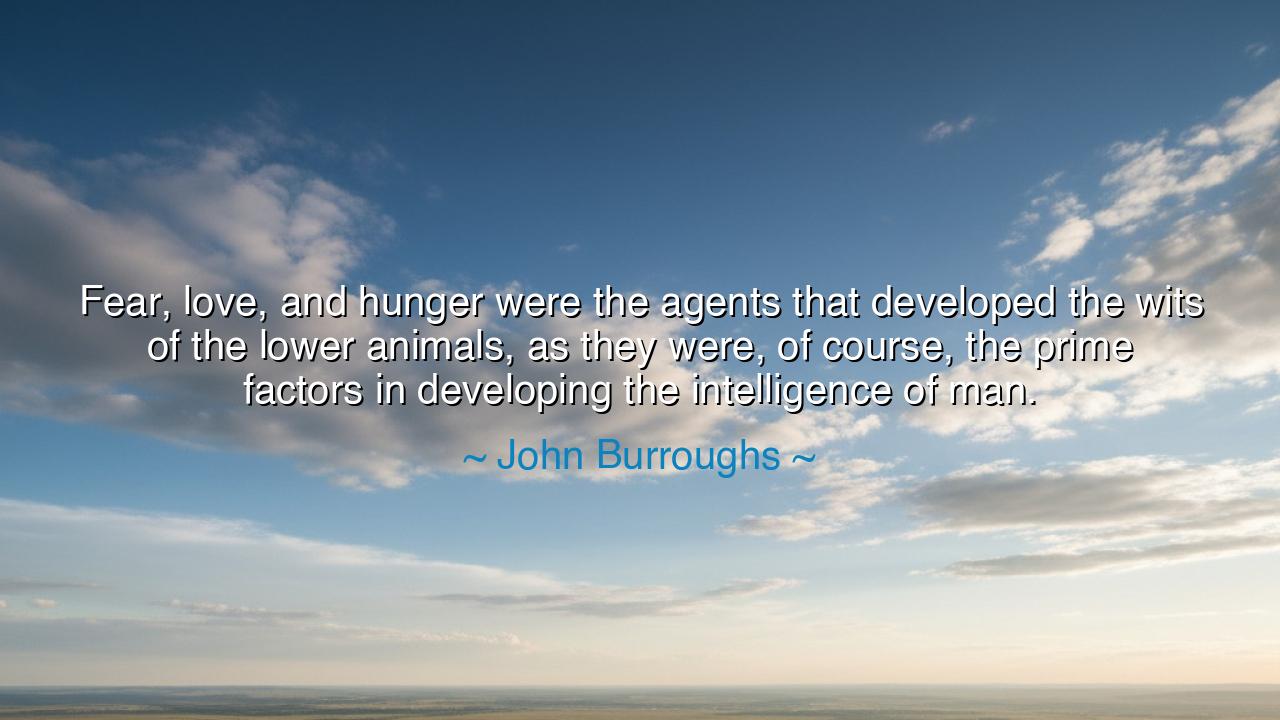
Fear, love, and hunger were the agents that developed the wits of
Fear, love, and hunger were the agents that developed the wits of the lower animals, as they were, of course, the prime factors in developing the intelligence of man.






In the profound and reflective words of John Burroughs, the naturalist and philosopher who listened to the language of the earth, we find a revelation about the deep roots of intelligence and instinct: “Fear, love, and hunger were the agents that developed the wits of the lower animals, as they were, of course, the prime factors in developing the intelligence of man.” Here, Burroughs reminds us that the great forces that shape all life — the yearning for survival, the drive to protect what one loves, and the instinct to flee from danger — are not base emotions, but the sacred engines of evolution. The mind, he teaches, did not rise from comfort, but from necessity, from the eternal struggles of existence that sharpened the senses, awakened awareness, and forged wisdom from suffering.
The origin of this thought lies in Burroughs’ lifelong contemplation of nature’s lessons. As one who walked among forests and fields, he saw the grandeur of life not in its separations — between man and beast — but in its continuities. He observed that the lower animals, though driven by simple needs, displayed profound ingenuity when facing hunger, danger, or the call to nurture their young. The fox that plans its path, the bird that hides its nest, the deer that senses a predator before it appears — all are thinkers in their own way, trained by fear, love, and hunger. From these primal experiences, Burroughs saw the lineage of humanity itself, whose intelligence was born not in temples or schools, but in the wilderness, where life demanded awareness, adaptability, and courage.
When Burroughs speaks of fear, he does not mean cowardice, but the sacred alertness that preserves life. Fear is the guardian of existence — the spark that teaches vigilance and foresight. In the ancient forests of our ancestors, it was fear that made man learn to build fire, fashion weapons, and seek shelter. Through fear, man discovered the wisdom of preparation and the prudence of restraint. Yet fear alone would have made him a creature of caution, not creativity. Thus entered hunger, that relentless teacher of invention — for in the pangs of emptiness, man learned to act, to strive, to conquer. Hunger was the first mentor of progress, for it awakened the will to shape the world rather than merely endure it.
But above all, love — that most mysterious of forces — lifted humanity beyond mere survival. It was love that made parents risk their lives for their children, tribes unite to defend their kin, and strangers share the fire’s warmth. Love taught compassion, loyalty, and sacrifice — the roots of every virtue. Through love, the mind was tempered by the heart, and intelligence became more than cunning; it became wisdom. Thus, Burroughs reveals that our greatest powers are not separate from our primal instincts, but born of them — that the divine spark in man first glowed in the ancient fires of fear, hunger, and love.
Consider the story of Hellen Keller, who was cast into a world of darkness and silence as a child. Fear might have destroyed her; hunger for connection might have driven her to despair. Yet it was love — the patient love of her teacher, Anne Sullivan — that transformed her life. Through that love, Keller’s intelligence flourished beyond all expectation, and she became a beacon of hope for generations. Her story is the living echo of Burroughs’ wisdom: that the very forces which test us most deeply are also those that awaken our highest potential. Struggle, when met with courage, refines the mind and ennobles the spirit.
Burroughs’ insight carries a lesson for the modern age, where comfort has dulled the edge of necessity. He warns, silently but surely, that ease can breed forgetfulness, and that intelligence, if not exercised by challenge, begins to decay. The ancients grew wise by facing storms and hunger, while we risk growing soft amidst abundance. Yet within us, the old fires still burn — the instinct to rise when afraid, to create when lacking, to love even when it hurts. If we embrace these forces not as burdens but as teachers, we return to the path that shaped all greatness.
The lesson, therefore, is clear: do not shun fear, for it sharpens; do not curse hunger, for it drives; and never lose love, for it ennobles. When life presses upon you, remember that these trials are not punishments, but the sacred forge of your intelligence and character. The mind that has never known adversity cannot grow wise, just as the metal that has never faced fire cannot become a blade. Let your fears teach you prudence, your hunger teach you persistence, and your love teach you compassion — and you will possess the same timeless strength that lifted humanity from the dust to the stars.
So, my child of thought and striving, carry Burroughs’ words as both comfort and challenge. Know that the forces which trouble you are the very forces that shape you. When the night seems long and your path uncertain, remember: it was fear, love, and hunger that made man what he is — not his comforts, but his courage; not his possessions, but his passion to endure. Walk boldly, therefore, into your trials, for they are the ancient hands that still carve the soul toward greatness.






AAdministratorAdministrator
Welcome, honored guests. Please leave a comment, we will respond soon